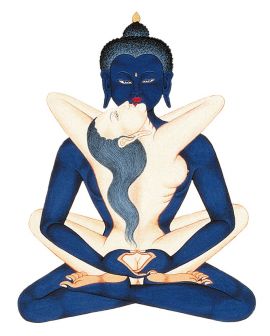Bön
Tulku Lobsang began his official monastic education at the young age of six. It began when he entered the Nangzi Bön Monastery. There, he received many foundational teachings, initiations and empowerments in this spiritual tradition of Tibet.
For many people, Tibet is the land of Buddhism. But, in fact, many Tibetans and Lamas also practice Bön, either independently or alongside Buddhism. On the surface they are Buddhist, and underneath there may be a core of Bön.
Bön was rooted long before the arrival of Buddhism. When Buddhism was introduced in Tibet, around the 7th century, Bön was at first persecuted and defamed as the new religion took hold. However, the Bonpos (as the practitioners are called) remained steadfast. Eventually, Bön not only continued to survive, but also thrived, as the practices were adapted to include those tenets of Buddhism that contributed to their worldview and furthered their aims on the path. For example, the higher form of Bön, Dzogchen, very closely resembles the Dzogchen of the Nyingma, which is the oldest of the four main school of Buddhism. Both are very high spiritual doctrines.
Bön is an ancient religion, but one still very alive and well today.
Bonpos aim to harmonize the microcosm with macrocosm. The more the individual, family and society are in alignment with the cycles and forces of nature, the less suffering and the more success there is in life. The Bonpos believe that there is divinity in all of nature—in the elements, as well as in each of us. Therefore, it is important to develop positive relationships between the individual and the various aspects of nature. In this way, the spirits and forces of nature can help us by removing obstacles and supporting us on our path of self-awareness.
Bön also teaches us about our innate healing energies and how we can enliven and balance ourselves. There are many meditation and movement techniques that deepen our awareness and sensitivity to subtle aspects of our being. We learn to connect with the five elements, which are the fundamental energetic qualities of our inner and outer nature.
Dzogchen, one of the highest teachings, is also part of the Bön tradition. The goal of Dzogchen, or The Great Perfection, is to enter the natural state of mind, which is pure light and wisdom. There is nothing to try, nothing to accept or reject, and nothing to transform. It is a self-perfected state in itself, and it is accessible to us because it is our nature.
Tulku Lobsang weaves together the wisdom of all lineages of Tibetan Buddhism and Bön. They all teach us about the true nature of our existence. The essence of the teachings remains the same—at the heart of our nature is pure, clear light and wisdom, and there are many methods to enable us to fully realize this.

